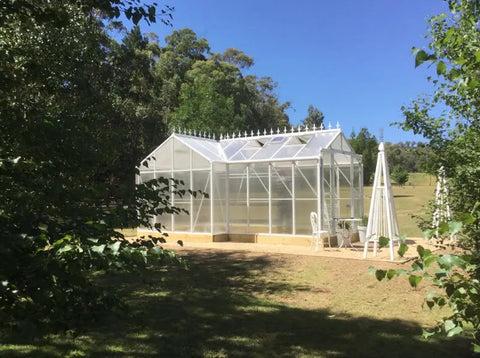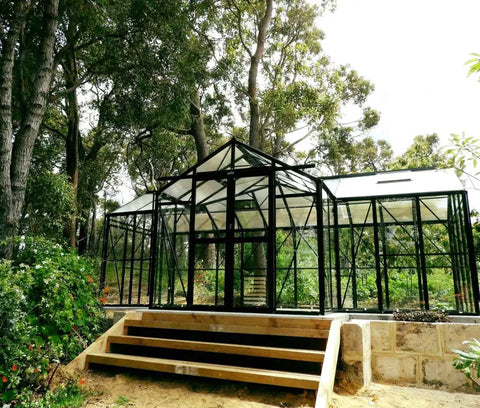Call, text, or email us -
0432883965
info@greenmyspace.com.au

Polycarbonate Greenhouses: Modern Innovation
Polycarbonate is a lightweight, durable, and thermally efficient plastic material that has gained immense popularity in greenhouse construction. Here are some key points to consider when contemplating a polycarbonate greenhouse:
Insulation and Heat Retention: Polycarbonate panels are known for their excellent insulation properties, making it easier to maintain a stable temperature within the greenhouse. This can be a game-changer for cultivating plants that require specific climatic conditions, especially during colder months.
Impact Resistance: Polycarbonate panels are highly resilient and shatterproof, making them a safer option, especially in areas prone to hail or strong winds. This durability ensures a longer lifespan for your greenhouse - and its also the reason why the standard Sproutwell Glasshouses come with polycarbonate roofs.
UV Protection: Many polycarbonate panels are designed with built-in UV protection, shielding your plants from harmful sun rays. This reduces the risk of plant damage and promotes healthier growth. UV protection also ensures the longevity of your polycarbonate panels, as without it they will quickly discolour and become brittle. Many brands offer 20 micron UV protectant layer (and some even have NO protection at all). We only stock Sproutwell polycarbonate, which goes through a Solar grade co-extruded process using a double layer equaling 50 micron UV protectant (which also allows them to offer a 10 year guarantee with their panels).
Light Diffusion: Some polycarbonate panels offer light diffusion, spreading sunlight more evenly throughout the greenhouse. This eliminates the risk of hotspots and shadows, providing optimal conditions for plant growth.

Glass Greenhouses: Timeless Elegance
Glass greenhouses have a long-standing tradition and offer a classic, sophisticated aesthetic. Here's why you might lean towards a glass greenhouse:
Visual Appeal: Glass provides unparalleled clarity, allowing you to enjoy an unobstructed view of your plants. The transparent nature of glass creates a visually pleasing space that can be an extension of your garden.
Natural Light: Glass allows maximum light transmission, enabling plants to receive the full spectrum of natural sunlight. This can be particularly beneficial for sunlight-hungry plants and for creating an inviting atmosphere for gardening.
Longevity: While glass can break, it'll never fade or discolour over time. Its also flame resistant so can work well if in close proximity to a BBQ.

Choosing the Right Greenhouse for You
Ultimately, the choice between polycarbonate and glass comes down to your specific requirements and preferences:
If you prioritise energy efficiency, durability, and ease of installation, a polycarbonate greenhouse might be your best bet.
If you value aesthetics, unfiltered sunlight, and are willing to invest in a potentially more delicate yet timeless option, a glass greenhouse could be the way to go.
In Conclusion
Both polycarbonate and glass greenhouses have their merits, and the decision hinges on factors like climate, plant type, budget, and personal taste. Consider your long-term gardening goals and the conditions your plants need to thrive. Whether you opt for the modern innovation of polycarbonate or the classic elegance of glass, your greenhouse will undoubtedly become a sanctuary for nurturing your botanical passions.